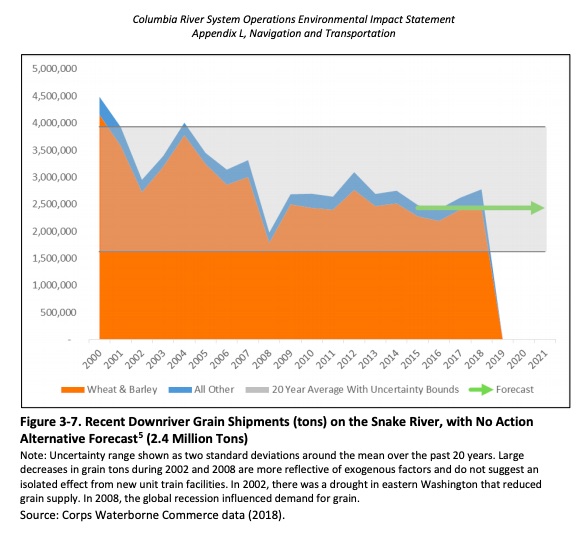forum
library
tutorial
contact

Wheat Farmers Ponder
Simpson's Next Dam Moves
by Matthew Weaver
Capital Press, June 10, 2021
|
the film forum library tutorial contact |

|
Wheat Farmers Ponder
by Matthew Weaver
|
River navigation advocates say rail and trucks are not economically or environmentally
sustainable alternatives to barging wheat and supplies on that part of the river.
 MOSCOW, Idaho -- Northwest wheat industry leaders say Idaho Rep. Mike Simpson's plan to remove four dams on the lower Snake River has little support.
MOSCOW, Idaho -- Northwest wheat industry leaders say Idaho Rep. Mike Simpson's plan to remove four dams on the lower Snake River has little support.
But they worry about what the Republican congressman could do to push the plan through anyway.
Idaho Wheat Commission, Oregon Wheat Commission and Washington Grain Commission leaders discussed their next steps June 9 in Moscow, Idaho.
"We just recognize that the Snake River issue is getting huge," said Glen Squires, CEO of the Washington commission.
Simpson has not proposed any legislation regarding his $33.5 billion plan, which he announced in February.
Following a recent Idaho Grain Producers Association meeting with Simpson, "Genesee" Joe Anderson, chairman of the Idaho commission, said there could be a "softening" on Simpson's part.
One of the big things Simpson wants is a 35-year moratorium on dam litigation pertaining to migrating fish, but Anderson said he doesn't think environmentalists will agree to that.
"I think it's supposed to be a legacy for him, but it's not gaining traction," Anderson said.
However, Simpson is on the House Appropriations Committee, and the wheat leaders expressed concern that he could insert funding into the pending infrastructure bill and then come up with an agreement.
"None of us know what this Simpson deal will morph into," said Mike Carstensen, grain commission chairman and a Lincoln County, Wash., farmer. "Something will happen, but the endgame for all of us, I believe, will be when it really goes after transportation.
Once the dams are out, the balance shifts from river navigation to rail, Carstensen said.
"You don't have to be a river user, you don't have to be in the Lewiston pool to have your transportation affected by having those dams coming out," he said.
River navigation advocates say rail and trucks are not economically or environmentally sustainable alternatives to barging wheat and supplies on that part of the river.
"Grain doesn't have a great track record of coming out on top in rail issues when there's high-priced petroleum wanting to run down the tracks -- and corn and soybeans," Anderson said.
The agriculture industry will continue to promote the environmental and economic benefits of the river system for decades to come, Anderson said. In 20 or 30 years, perhaps technology could make some of the things Simpson wants possible, he says, such as a replacement for the electricity the dams generate.
"There may be hydrogen-powered electric autonomous semis that can run down the river in 20 or 30 years, but they're not there now," Anderson said. "I don't like to even think about agreeing to anything on theoretical or conceptual fixes to a problem."
Squires said the Washington Association of Wheat Growers, the lobbying arm of the state's industry, increased its funding to the Inland Ports and Navigation Group, the legal arm of the Pacific Northwest Waterways Association. He recommended other grower organizations also be aware of the group.
Agriculture stakeholders support the Columbia River System Operations environmental impact statement and NOAA Fisheries' salmon recovery plan.
learn more on topics covered in the film
see the video
read the script
learn the songs
discussion forum
